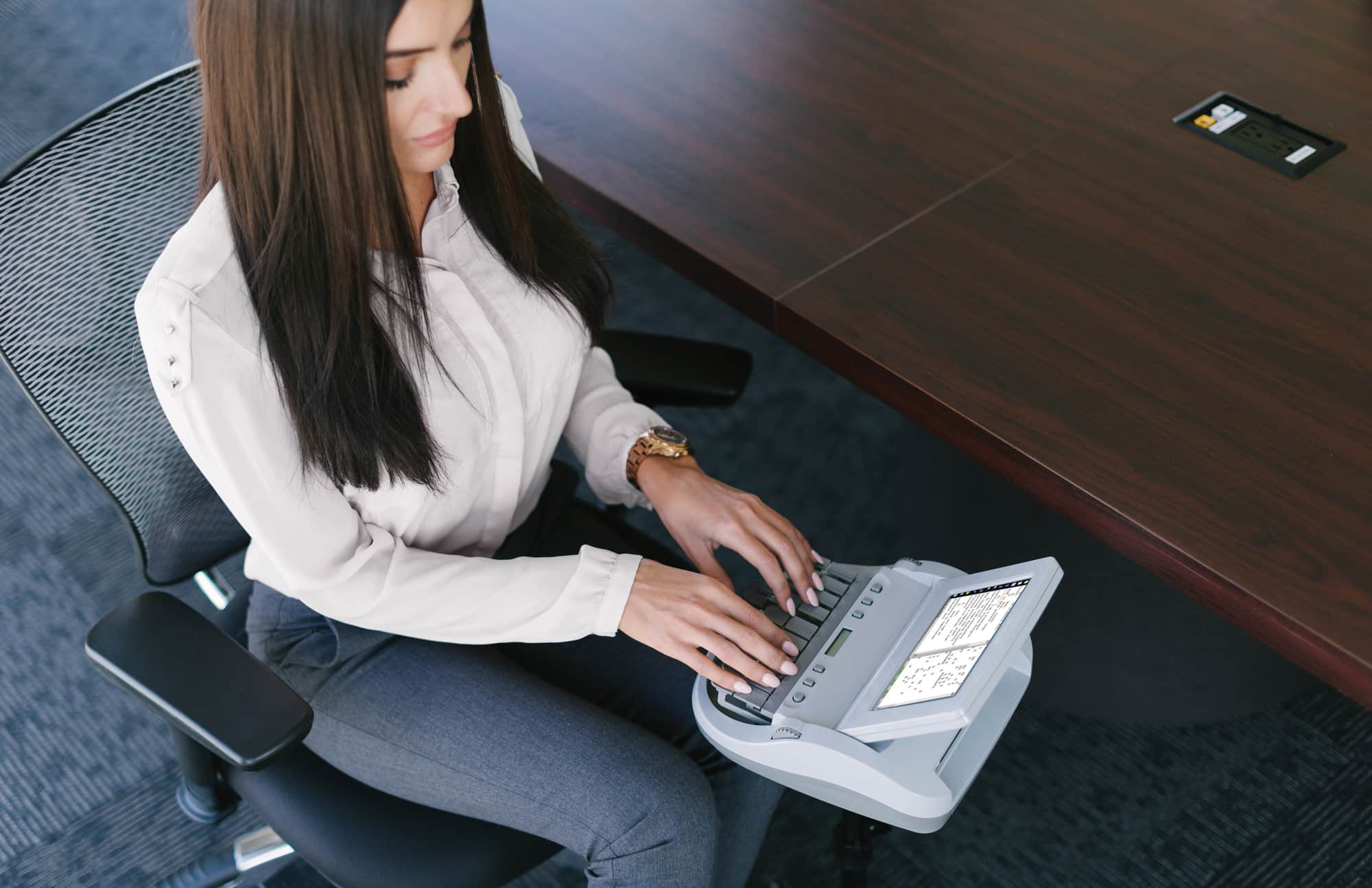The Skills Every court reporting Expert Must Have in 2025
The Skills Every court reporting Expert Must Have in 2025
Blog Article

The Future of Court Coverage: Technologies and Trends Forming the Sector
As you discover the future of court coverage, you'll notice a shift driven by technology and innovation. Real-time transcription and AI applications are reshaping how legal proceedings are recorded. With remote depositions gaining traction, the landscape is developing swiftly. It increases inquiries regarding the function of stenotype reporter and the abilities they'll require relocating forward. What does this mean for professionals in the field? The answer could shock you.
The Effect of Expert System on Court Coverage
As artificial knowledge continues to develop, it's reshaping the landscape of court reporting in ways you may not anticipate. You might find that AI tools are simplifying tasks commonly handled by human press reporters, enabling greater performance. As an example, AI can analyze vast quantities of lawful text, aiding you determine appropriate criteria and streamline instance preparation. You'll additionally observe AI-driven applications aiding in document administration, making it less complicated for you to organize and obtain necessary information swiftly.
Furthermore, AI can enhance the prep work process by providing anticipating analytics, which can help you anticipate trial outcomes based upon historic data. This isn't practically replacing tasks; it has to do with boosting your capacities. With AI dealing with regular jobs, you can concentrate a lot more on your core responsibilities, such as ensuring precision and providing important lawful understandings. Embracing these changes can position you as a forward-thinking professional in a changing market.
Real-Time Transcription: Enhancing Accuracy and Effectiveness
Real-time transcription has actually changed the court reporting process, making it much easier than ever before for you to record exact records on the spot. With sophisticated modern technology, you can now supply prompt transcripts throughout hearings or depositions, ensuring that all parties have accessibility to important information immediately. This immediacy not just improves the general efficiency of the lawful process but likewise allows you to concentrate on the dialogue, as opposed to rushing to catch up.
As you use real-time transcription, you'll notice a significant reduction in mistakes, many thanks to automated proofreading devices that flag incongruities as you type. In addition, clients value the capability to assess records immediately, allowing quicker decision-making and smoother procedures. By accepting this innovation, you're not just enhancing your workflow; you're establishing a new standard in court coverage that focuses on precision and performance. This forward-thinking method positions you at the leading edge of the evolving lawful landscape (court reporting).
The Surge of Remote Depositions

With the expanding need for adaptability in legal procedures, remote depositions have actually become a game-changer in court reporting. You can now take part in depositions from anywhere, getting rid of traveling time and costs. This comfort allows you to concentrate on what truly matters-- preparing your situation.
Remote depositions utilize sophisticated technology, enabling real-time communication and paper sharing. You can involve with witnesses and lawyers perfectly, making certain that everybody continues to be connected despite their physical location. This strategy not only saves time yet likewise increases your pool of expert witnesses, as geographical barriers end up being much less of a problem.
As remote depositions gain appeal, it's essential to adjust to this new norm. Acquaint yourself with the required devices and protocols to assure a smooth experience - court reporting. Embracing this advancement can give you an one-upmanship, allowing you to navigate the ever-evolving landscape of legal proceedings effectively
Digital Courtrooms: Transforming the Lawful Landscape
As you tip into the globe of digital court rooms, you'll observe exactly how online hearing innovation is improving legal procedures. This shift not just makes gain access to much easier yet also enhances transcription precision, making sure every word is caught correctly. Welcoming these developments can significantly boost the performance of the lawful process.
Digital Hearing Modern Technology
While the traditional court setup has actually long been a symbol of justice, the rise of virtual hearing innovation is reshaping just how lawful process are conducted. In addition, online hearings can improve involvement, enabling witnesses and specialists to offer statement without the constraints of area. As you adjust to these changes, you'll notice that digital hearings preserve the honesty of the legal procedure while welcoming advancement, ultimately transforming the way justice is served in the contemporary world.
Improved Transcription Precision
Boosted transcription precision is revolutionizing the legal area, making court procedures a lot more trusted than ever before. As an outcome, crucial details aren't shed in translation, making sure that the honesty of the legal process is maintained. Accepting these innovations means you're stepping right into a future where quality reference and accuracy in legal paperwork are extremely important, inevitably profiting all events entailed in the judicial system.
The Function of Court Reporters in Virtual Hearings
Court reporters play an important function in online hearings, ensuring that every word spoken is properly recorded and recorded in real-time. As a court reporter, you help with communication in between events, making intricate lawful procedures available. Your proficiency in legal terms and the capacity to quickly adjust to different audio speakers are essential in this digital atmosphere.
During virtual hearings, you maintain a steady focus, also among technological obstacles or diversions. You provide a clear, written record that can be referenced later on, helping courts, attorneys, and clients understand the procedures. Your abilities in steering different systems guarantee that you can perfectly integrate right into any type of online setup.
Moreover, you likewise help promote the integrity of the judicial process, verifying that every individual's voice is listened to. By doing this, you not only improve the efficiency of lawful process however also add to the total fairness and transparency of the justice system.
Developments in Documentation and Record Maintaining
As innovation develops, innovations in documents and document keeping are changing exactly how stenotype reporter capture and handle legal transcripts. You'll find that digital devices permit quicker and much more exact transcription, lowering the chances of human mistake. Cloud-based storage space solutions enable you to safely save and access records from anywhere, making partnership with lawful groups seamless.
Expert system is also playing a considerable function, assisting with real-time transcription and even using wise editing attributes. These improvements not just boost efficiency but also assure that you can offer high-quality paperwork in a busy lawful atmosphere.
Furthermore, the integration of voice recognition software application simplifies the procedure, allowing you to focus much more on the nuances of the proceedings as opposed to simply inputting. By accepting these developments, you're placed to boost your abilities and fulfill the needs of modern-day court reporting effectively.
Future Abilities and Educating for Court Reporters
While innovation reshapes the landscape of legal process, it's crucial for stenotype reporter to adapt by obtaining new skills and training. You'll need to acquaint yourself with advanced transcription software program and digital reporting devices to stay affordable. Embracing fabricated intelligence and real-time captioning will boost your effectiveness and accuracy.
Additionally, establishing visit this website solid study and logical abilities is crucial. You'll frequently encounter complex legal lingo and treatments, so understanding legal ideas will sharpen your reporting. Online training courses and workshops can give important insights right into these locations.
Connecting with various other specialists will likewise assist you stay updated on market patterns. Signing up with organizations or participating in conferences can reveal you to brand-new technologies and finest practices.
Finally, refining your interpersonal skills will improve interaction with lawyers and customers. By focusing on these locations, you'll place on your own for success in the advancing area of court coverage.
Regularly Asked Questions

What Certifications Are Needed to End Up Being a Stenotype Reporter Today?
To end up being a court reporter today, you'll require a secondary school diploma, specialized training in court coverage, and accreditation, frequently via a nationwide test. Strong inputting skills and attention to information are important for success.
Exactly How Can Court Reporters Keep Updated With New Technologies?
To remain updated with brand-new technologies, you must attend workshops, join specialist companies, and sign up for appropriate publications. Connecting with peers and taking part in on-line discussion forums can additionally keep you educated regarding the current developments.
What Is the Average Wage for Court Reporters Currently?
The typical salary for stenotype reporter differs by place and experience, but you can anticipate around $50,000 to $70,000 annually. In some locations, experienced reporters can earn also more, specifically with specialized abilities.
Are There Work Opportunities for Court Reporters in Non-Legal Fields?
Yes, there are task possibilities for court reporters in non-legal areas. You can find roles in closed captioning, transcription services, and media, where see this your abilities in catching talked language are extremely valued and demanded.
Just How Does Court Coverage Differ in Various Nations?
Court reporting differs considerably throughout countries. You'll discover distinctions in terminology, innovation, and legal systems. As an example, some countries highlight electronic coverage, while others still depend on typical stenography approaches for recording talked words.
Report this page